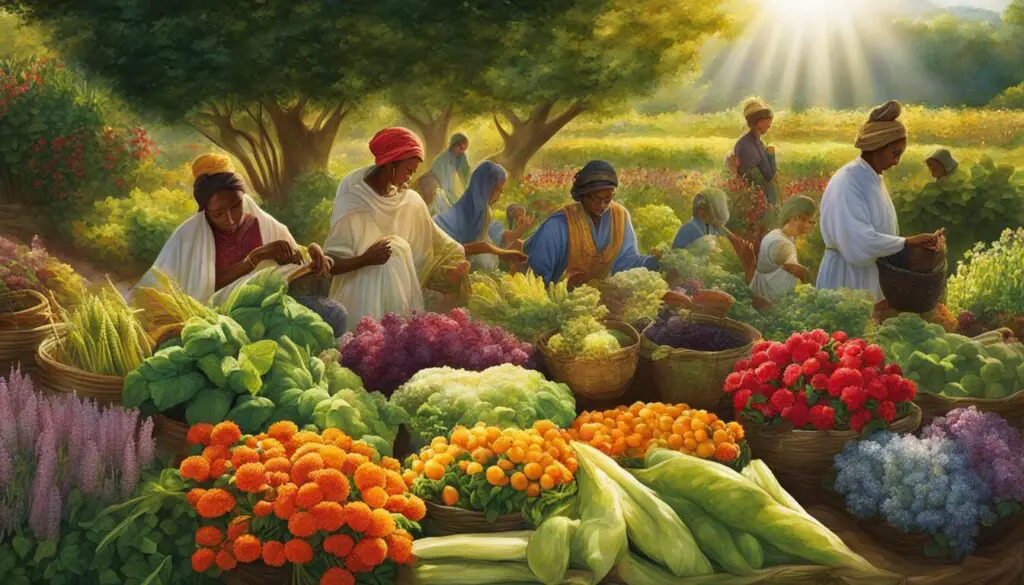Harvest in the Bible refers to the gathering of things planted and the reaping of what has been produced during the year in an agricultural community. It carries theological significance, with Jesus referring to God as the “Lord of the harvest.” Harvest is seen as part of God’s work and control, and believers are encouraged to ask for laborers in the harvest field. The Bible also emphasizes the importance of human response and offerings from the harvest, as well as the joy and festivals associated with the harvest season. Additionally, metaphorical usage of harvest in the Bible alludes to both positive aspects such as righteousness and negative aspects such as judgment.
Key Takeaways:
- Harvest in the Bible refers to the gathering of crops and carries theological significance.
- Jesus referred to God as the “Lord of the harvest”.
- Believers are encouraged to ask for laborers in the harvest field.
- Metaphorical usage of harvest in the Bible alludes to positive and negative aspects such as righteousness and judgment.
- The joy and festivals associated with the harvest season are emphasized in the Bible.
Significance of Harvest Festivals in the Bible
Harvest festivals played a significant role in the biblical culture, serving as occasions to celebrate and give thanks for the abundance of the harvest. Two main festivals, the Festival of Harvest and the Festival of Booths, held special importance.
Festival of Harvest
The Festival of Harvest, also known as the firstfruits, took place in the spring, fifty days after Passover. It was a time to offer thanks to God for the bountiful harvest. During this festival, the firstfruits of the crops were presented as an offering to God, symbolizing gratitude for His provision. The Festival of Harvest served as a reminder that all good things come from God and that it is He who sustains us with His abundance.
Festival of Booths
The Festival of Booths, held at the end of the harvest season in the fall, was a joyful celebration of the completed harvest. It served as a time for the people to dwell in temporary booths or tents, symbolizing their dependence on God and His provision. This festival was a reflection of God’s faithfulness and His blessings upon His people. It emphasized the importance of acknowledging God’s role in the harvest and expressing gratefulness for His abundant provision.
Symbol of Abundance and Blessings
“But I am like a green olive tree in the house of God; I trust in the mercy of God forever and ever. I will praise You forever because You have done it; and in the presence of Your saints, I will wait on Your name, for it is good.” – Psalm 52:8-9
Harvest festivals serve as symbols of abundance and blessings in the Bible. They remind us of God’s faithfulness and provision throughout the year. The festivals provided an opportunity for the people to come together, rejoice, and express their gratitude for the plentiful harvest. Through these celebrations, the biblical culture placed great importance on recognizing God’s hand in the harvest and acknowledging His goodness.
| Festival | Date | Purpose |
|---|---|---|
| Festival of Harvest | Spring, fifty days after Passover | To offer thanks for the abundance of the harvest |
| Festival of Booths | End of the harvest season in the fall | To celebrate the completed harvest and symbolize dependence on God |
As believers, harvest festivals serve as a reminder of God’s provision and blessings in our lives. They encourage us to express gratitude and to recognize the abundance of His blessings. By participating in these festivals, we join in the biblical tradition of thanking God for His faithfulness and acknowledging His role as the provider of all good things.
Spiritual Harvest and Sowing and Reaping
The concept of a spiritual harvest is found in the teachings of Jesus. He spoke of the spiritual harvest as the realization of souls waiting to be brought to repentance and faith. Just as a farmer sows seeds and patiently waits for them to grow, believers are called to sow the seed of God’s Word and trust in God’s timing for the harvest. This spiritual harvest is the result of God’s work in the hearts of people, and believers are urged to pray for laborers in the harvest field.
“The harvest is plentiful, but the laborers are few.” This statement by Jesus emphasizes the need for workers who will actively participate in bringing souls to Him. It is a call to action for believers to share and spread the message of salvation and to be intentional in their efforts to bring others into a relationship with God. Sowing and reaping in the spiritual realm involves sharing the truth of the Gospel and witnessing the transformation of lives as individuals respond to God’s love and grace.
“Those who sow in tears shall reap with shouts of joy.” – Psalm 126:5
Throughout the Bible, the metaphor of sowing and reaping is used to illustrate the process of spiritual growth and maturity. Just as a farmer diligently tends to his crops, believers are called to cultivate their own lives and the lives of those around them. This involves nurturing faith, practicing discipleship, and investing in relationships. It also requires patience and trust in God’s timing for the harvest to come.
Praying for laborers in the harvest field is an essential part of participating in the spiritual harvest. Recognizing that it is ultimately God who brings about the transformation of hearts, believers are called to intercede on behalf of those who have yet to come to know Him. Prayer is a powerful tool in the work of sowing and reaping, as it aligns our hearts with God’s will and invites His power to bring about the spiritual harvest.

Key Points:
- The spiritual harvest involves bringing souls to repentance and faith.
- Believers are called to sow the seed of God’s Word and trust in His timing for the harvest.
- Praying for laborers in the harvest field is crucial for the spiritual harvest.
- The metaphor of sowing and reaping emphasizes the need for cultivation and patience.
Symbolism of Harvest in the Bible
The concept of harvest in the Bible goes beyond the gathering of physical crops; it is rich in symbolism that represents spiritual concepts. One significant symbol is found in the parable of the wheat and tares, where Jesus uses the imagery of a harvest to illustrate the separation of the righteous and the wicked. The wheat represents the righteous, while the tares symbolize the wicked. This metaphor reminds believers of the ultimate judgment and the consequence of one’s actions.
Furthermore, harvest is also seen as a symbol of abundance and blessings from God. It signifies His provision and sustenance for His people. Throughout the Bible, harvest festivals and offerings are emphasized as a way to acknowledge and thank God for His blessings. The joy that accompanies a bountiful harvest serves as a reminder of God’s faithfulness and goodness.
“The gathering of the wheat and tares symbolizes the separation of good and evil, with the wheat representing the righteous and the tares representing the wicked.”
Understanding the symbolism of harvest in the Bible helps believers to reflect on their relationship with God and His plan for their lives. It prompts gratitude for His provision and blessings, while also reminding individuals to live righteous lives in anticipation of the final harvest. The symbolism of harvest provides a profound insight into the character of God and His divine plan for humanity.
| Symbolism | Meaning |
|---|---|
| Gathering of Wheat and Tares | Separation of the righteous and the wicked |
| Abundance and Blessings | God’s provision and sustenance |
Harvest and Thanksgiving
The concept of harvest in the Bible is closely associated with thanksgiving and gratitude. Throughout the Scriptures, there are numerous references to the importance of expressing thankfulness for God’s provision. Harvest provided a tangible opportunity for the people of Israel to acknowledge God’s faithful provision and express their gratitude. The act of offering offerings from the fullness of the harvest was a way for the people to give thanks to God for His blessings.
Thanksgiving and gratitude are recurring themes in the Bible. In Psalm 100:4, it says, “Enter his gates with thanksgiving and his courts with praise; give thanks to him and praise his name.” This verse emphasizes the importance of approaching God with a heart of thankfulness. Throughout the Bible, we see instances of thanksgiving and gratitude being expressed in various forms, such as songs of praise, prayers of thanksgiving, and offerings of gratitude.
“Give thanks in all circumstances; for this is God’s will for you in Christ Jesus.” – 1 Thessalonians 5:18
Harvest serves as a reminder of the faithfulness and goodness of God. It is a time to reflect on our relationship with Him and to express gratitude for His blessings. As we celebrate the harvest and partake in Thanksgiving festivities, let us remember the biblical references to harvest and the importance of giving thanks to God for His provision.
The Lord of the Harvest and God’s Provision
Throughout the Bible, God is referred to as the “Lord of the harvest,” emphasizing His sovereignty and control over the agricultural cycle and all aspects of life. He is the one who brings the harvest to fruition, making it abundantly clear that the provision of crops and sustenance ultimately comes from Him.
Just as farmers plant and tend to their crops, believers are reminded that it is God who works behind the scenes, ensuring that the harvest is plentiful. He blesses the labor of their hands and provides for their needs. This recognition of God’s role as the Lord of the harvest helps believers maintain a humble and grateful attitude, acknowledging His faithfulness and generosity.
God’s provision extends beyond physical crops to encompass all areas of life. Just as He provides for the needs of the land, He also provides for the spiritual growth and blessings of His people. The Lord of the harvest is not limited to the agricultural realm but is actively involved in every aspect of His creation, ensuring that His children lack nothing.
“And my God will supply all your needs according to His riches in glory in Christ Jesus.” – Philippians 4:19
The Lord of the harvest not only provides for our physical needs but also cares about our spiritual well-being. Just as He brings forth a bountiful harvest in the fields, He desires to bring forth spiritual fruit in the lives of His children. He works in ways that are beyond our understanding, orchestrating circumstances and opportunities for growth. As believers, we can trust in His timing and provision, knowing that He will bring about a harvest of righteousness in our lives.
| God’s Provision | Scripture References |
|---|---|
| Physical Needs | Matthew 6:26, Philippians 4:19 |
| Spiritual Growth | John 15:5, Galatians 5:22-23 |
| Protection and Guidance | Psalm 23:1-3, Psalm 32:8 |
| Salvation and Eternal Life | John 3:16, Romans 6:23 |
As we reflect on the Lord of the harvest and His provision, let us be filled with gratitude and trust. He is faithful to provide for our physical and spiritual needs, guiding us along the path of righteousness. May we continue to rely on Him as our source of sustenance and blessings, recognizing His sovereignty in every season of life.

Metaphorical Uses of Harvest in the Bible
The concept of harvest in the Bible extends beyond its literal meaning. It is often used metaphorically to convey deeper spiritual truths and teachings. One common metaphorical usage of harvest is in the context of judgment. In the Bible, harvest symbolizes the separation of the righteous and the wicked, representing the consequences of one’s actions and choices.
In one of Jesus’ parables, the gathering of the wheat and tares serves as a metaphor for the final judgment. The wheat represents the righteous, who will be gathered into God’s kingdom, while the tares symbolize the wicked, who will face punishment and separation from God. This metaphorical usage underscores the importance of living a righteous life and the ultimate consequences of our actions.
“The Son of Man will send out his angels, and they will weed out of his kingdom everything that causes sin and all who do evil. They will throw them into the blazing furnace, where there will be weeping and gnashing of teeth. Then the righteous will shine like the sun in the kingdom of their Father.”
Another metaphorical representation of harvest in the Bible is the spiritual harvest of righteousness. Just as a farmer sows seeds and patiently waits for them to grow and bear fruit, believers are called to sow the seed of God’s Word and trust in His timing for the spiritual harvest. This metaphor emphasizes the importance of faithfully sharing the gospel, as well as the joy and fulfillment that come from seeing souls brought to repentance and faith.
Metaphorical Usage Table: Harvest and Judgment
| Metaphorical Usage | Explanation |
|---|---|
| Gathering of the Wheat and Tares | Symbolizes the separation of the righteous and the wicked, representing the final judgment. |
| Spiritual Harvest of Righteousness | Metaphorically represents the process of bringing souls to repentance and faith, akin to a farmer sowing and reaping. |
The Role of Laborers in the Harvest
Believers play a crucial role as laborers in the spiritual harvest. Just as farmers sow seeds, believers are called to sow the seed of God’s Word and share the message of salvation with others. The process of sowing and reaping requires dedicated workers who are willing to step out in faith and spread the good news. By actively participating in the harvest, believers contribute to the growth of God’s kingdom and the salvation of souls.
Prayer is an essential aspect of laboring in the harvest field. Jesus emphasized the importance of praying for laborers, recognizing that more workers are needed to carry out the mission. Through prayer, believers can intercede for individuals to receive the gospel and for more laborers to be raised up. Praying for laborers demonstrates our reliance on God’s power to bring about transformation in the hearts of people and to empower workers for the harvest.
Being a laborer in the harvest requires a willingness to step out of our comfort zones and engage with those who may not yet know Christ. It involves building relationships, sharing the truth in love, and demonstrating the life-transforming power of the gospel through our words and actions. Each believer has a unique role to play in the harvest, whether it be leading others to Christ, discipling new believers, or supporting the work of evangelism through prayer and financial resources.
Praying for Laborers in the Harvest
“The harvest is plentiful, but the workers are few. Ask the Lord of the harvest, therefore, to send out workers into his harvest field.” – Matthew 9:37-38
As believers, let us embrace our role as laborers in the harvest. Let us fervently pray for more workers and actively engage in sharing the gospel with those around us. The spiritual harvest is a collective effort, and through our partnership with God, we can witness lives being transformed and souls being saved. May we be faithful in sowing the seed and trusting in God’s timing and provision as we labor in His harvest field.

Table: Laborers in the Harvest
| Role | Responsibilities |
|---|---|
| Evangelists | Share the gospel with non-believers, lead them to Christ |
| Disciplers | Support new believers in their spiritual growth and discipleship journey |
| Prayer Warriors | Intercede for the salvation of souls and for more laborers in the harvest field |
| Financial Supporters | Provide resources to support the work of evangelism and mission |
The Spiritual Harvest and God’s Timing
In the context of the Bible, the concept of the harvest extends beyond the physical gathering of crops. It also encompasses the spiritual growth and maturity of believers. Just as a farmer sows seeds and patiently waits for them to grow, we are called to sow the seed of God’s Word and trust in God’s timing for the spiritual harvest.
God’s timing is not always our own, and it requires patience and faith to wait for the fruit of our labor. As the Apostle Paul writes in Galatians 6:9, “Let us not become weary in doing good, for at the proper time, we will reap a harvest if we do not give up.” This verse reminds us that our effort and perseverance in sowing will eventually yield a bountiful harvest according to God’s perfect timing.
When we trust in God’s timing, we acknowledge that He is in control of the results. We may not see immediate growth or witness the impact of our spiritual labor right away, but we can rest assured that God is at work. Our role is to faithfully carry out the tasks He has given us, whether it’s sowing, tending, or reaping. We can find peace and assurance in knowing that God will bring about the desired outcome in His perfect timing.

Ultimately, the spiritual harvest is a reminder of our dependence on God. It teaches us humility as we recognize that we are not in control of the results. Instead, we rely on God’s provision, guidance, and perfect timing. As we patiently wait for the spiritual harvest, we can find encouragement in the promises of Scripture and the example of those who have gone before us. Like the farmer who trusts in the changing seasons, we can trust in God’s faithfulness and His plan for the growth and maturity of souls.
Conclusion
The concept of harvest in the Bible carries theological, symbolic, and practical significance. It serves as a reminder of God’s provision, blessings, and faithfulness in our lives. Harvest festivals, such as the Festival of Harvest and the Festival of Booths, provide occasions for expressing gratitude and thanksgiving for God’s abundant blessings.
The metaphor of the spiritual harvest emphasizes the need for laborers in spreading the message of God’s Word and bringing souls to repentance and faith. Just as the farmer sows seeds and patiently waits for the crops to grow, believers are called to sow the seed of God’s Word and trust in His timing for the spiritual harvest to come.
Understanding the role of the Lord of the harvest highlights God’s sovereignty and control over the harvest and all aspects of life. It fosters a sense of patience and trust in His timing. As believers, we are invited to reflect on our relationship with God, express gratitude for His provision, and actively participate in the work of bringing souls to repentance and faith.
In conclusion, the biblical meaning of harvest encompasses not only the physical gathering of crops but also the spiritual growth and maturity of individuals. It invites us to recognize God’s faithfulness, embrace His timing, and respond with gratitude and active involvement in sharing the message of salvation with others.
FAQ
What does harvest mean in the Bible?
Harvest in the Bible refers to the gathering of things planted and the reaping of what has been produced during the year in an agricultural community.
What is the significance of harvest festivals in the Bible?
Harvest festivals were an integral part of the biblical culture, with at least two main festivals focused on celebrating the harvest. They were a way for the people to acknowledge God’s part in the harvest and express gratitude for his provision.
What is the spiritual harvest and sowing and reaping?
The concept of a spiritual harvest is found in the teachings of Jesus. It refers to the realization of souls waiting to be brought to repentance and faith. Believers are called to sow the seed of God’s Word and trust in God’s timing for the harvest.
What is the symbolism of harvest in the Bible?
Harvest is rich in symbolism in the Bible. It represents abundance, blessings, and the separation of good and evil. It signifies the provision and sustenance that God provides for his people and the joy that accompanies a bountiful harvest.
How is harvest associated with thanksgiving?
Harvest is closely associated with gratitude and thanksgiving in the Bible. It provided a tangible opportunity for the people to recognize and thank God for his provision. Gratitude and thanksgiving are recurring themes throughout the Bible, and harvest serves as a reminder of God’s faithfulness and goodness.
What is the role of the Lord of the harvest?
The Bible refers to God as the “Lord of the harvest.” This title highlights God’s sovereignty and control over the harvest and all aspects of life. It is a reminder that the harvest is part of God’s work and provision.
How is harvest metaphorically used in the Bible?
Harvest is metaphorically used in the Bible to convey both positive aspects such as righteousness and negative aspects such as judgment. It serves as a vivid image to symbolize the joy of the righteous and the consequences of judgment for the wicked.
What is the role of laborers in the harvest?
Jesus calls believers to pray for laborers in the harvest field. This highlights the importance of individuals who actively participate in sharing the gospel and bringing souls to repentance and faith.
What is the spiritual harvest and God’s timing?
The spiritual harvest, like the physical harvest, requires patience and trust in God’s timing. Believers are called to be patient in the process of spiritual growth and maturity, faithfully carrying out the tasks that God has given them and trusting Him to bring about the desired outcome.







